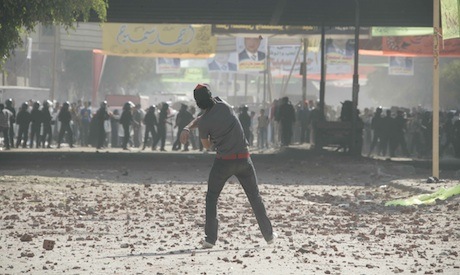
Copts clashed with police on Wednesday when authorities imposed a halt to construction in a Coptic church in the Giza district of Omrayneya (photo: Nasser Noury)
Amidst the backdrop of Al-Qaeda threats emerging from Iraq, and recent clashes between police and civilians over construction work in a Coptic Church, Egypt’s minority Coptic Christian population has been left feeling marginalized in the State’s upcoming parliamentary elections. The ruling National Democratic Party (NDP) has fielded just 10 Coptic candidates out of if its 770 nominees vying for the 508 available seats. Of a total 5,121 candidates running for election, just 81 – less than 2 percent – are Copts.
The official selection was received with dismayed reaction from the Coptic community. Former Coptic MP Mona Makram Ebeid called the choice “political”, and in Alexandria, members of the community have publicly spoken out in critique of the NDP for failing to fairly consider the estimated 690 names put forward by the Coptic Church.
Among the candidates, NDP member Magdy Armanious has filed a lawsuit through the prominent Coptic human rights lawyer Naguib Gobrael for being excluded by the NDP as a parliamentary candidate. Armanious, who was to campaign on the back of strong support secured in electoral divisions, is raising case on the basis of being prevented from running both for his party and as an independent. Gobrael has said his exclusion, and marginalization, is unconstitutional and reflects party line. Last year, as part of an official delegation meeting with the NDP, Gobrael presented a document addressed to President Hosni Mubarak calling for greater religious freedom and representation for Copts.
Critics have cited the lack of Coptic representation in the elections as yet another antic by the government to suppress voices of opposition and maintain the status quo. Coptic representation falls even lower than that of women – this year close to 130 women will be running for seats. It also falls at almost fifty percent of Muslim Brotherhood representation – 140 of the group’s candidates will be running as independents.
In Cairo, at the Coptic Orthodox Cathedral in Abassiya the weekend after the announcement – the Papal headquarters of Patriarch Pope Shenouda III - the Pope himself could not be reached for comment about Coptic representation in government. A spokesperson from his office said the Church feels “support” from the State. He would not comment on Coptic representation in the upcoming elections. An NDP spokesperson said the allegations of political marginalization were “false”.
Members of the Coptic community – who were on the grounds of the Abassiya monastery for church services that weekend - said the NDP’s snubbing of the Church’s selection of candidates is cause for concern, and mirrors the State position towards Copts. “We feel scared,” said Marc Hanna, an accountant and recent university graduate. “This week's violence has only added to the threat of persecution we already feel as a minority. That our voices are not fully represented in government is also worrying. We need people to speak for us. We need a law that protects us as it does Muslims.”
Copts, who officially make up between six to ten percent of the country’s 80 million population, have regularly complained of persecution in the past decades. The community has been the subject of marginalization since the Arab conquest in the seventh century. Fear has been re-ignited following the Baghdad Church siege this month and subsequent Al-Qaeda warnings of attacks on Christian sites around the region.
Although some of the country’s most prominent businessmen and Ministers are Coptic – including Minister of Finance and parliamentary candidate Youssef Boutros Ghali -- discrimination suffered by the population’s majority middle and lower working class has been widespread. “The Coptic community is vulnerable and exposed to sectarian violence,” said Hossam Bahgat, executive director of the Cairo-based Egyptian Initiative for Human Rights.
This week, civilians clashed with anti-riot police over allegedly “unauthorized” construction on a church in Cairo, leaving two people dead and dozens injured. The Pope has publicly denounced the violence, and in demonstrations held outside the Attorney General’s office, Muslim and Christian protestors described the government as "the regime that oppresses the Copts arrests the youth", calling on “an Egypt for all”. In January of this year, on the eve of the Copts’ Christmas of January 7th, a drive-by shooting in the southern town of Nag Hamadi killed 8 Copts as they were leaving Church following mass.
The NDP’s nomination of parliamentarian Adel Rehim El-Ghoul – a candidate for re-election from Qena - has stirred further unease in the community. El-Goul is alleged to have been connected with the Naga Hammadi shooting in January. Although no charges were pressed against him, dozens of Copts filed complaints to the Prosecutor General against El-Ghoul, accusing him of inciting the suspects to commit the crime. His selection by the NDP as a parliamentary candidate has been widely seen as an insult to the community.
Short link: